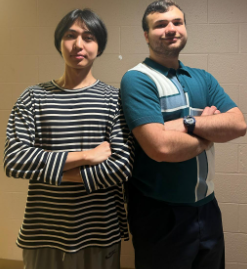by Brittney Atkins | Staff Writer
One may ask, “What makes a Presbyterian College education superior to surrounding institutions?” Dr. Serge Afeli and Dr. Blake Miller, Director and Assistant Director of Innovation and Entrepreneurship at the Presbyterian College Pharmacy School, may attribute the superiority to an advantageous liberal arts degree.
Afeli and Miller are putting their “Innovator” titles into practice as they assemble a diverse group of Presbyterian College scholars to comprise a team of hackers they are calling the Pharmacy Innovation Lab. Most people hear the word hacker and their mind envisions someone behind a computer screen illegally accessing all of their personal information. Instead, this group of “hackers” will serve as problem solvers, using their diverse knowledge of various disciplines to solve issues within the healthcare field.
The justification of a liberal arts education is its auspicious ability to allow students to gain a wide range of knowledge and experiences. A liberal arts education also affords scholars the opportunity to interact with other students pursuing degrees in a separate field. The thought process and approach a scientist would take to solving problems is completely different than the approach an artist, engineer, musician, or technician would assume. The inner workings of a person’s brain, whether they be wired to think formulaically or creatively, allows them to thrive within their chosen field, but when these differing individuals come together to attack a problem they have the potential to complement one another and produce something groundbreaking.
This potential is the basis for which Afeli and Miller are assembling their Pharmacy Innovation Lab. The Lab will comprise of individuals with varying specialties and talents, who will come together in what Afeli calls a “thinking deck” to share and discuss ideas. The thinking deck will involve a five step process.
First, the group will brainstorm and identify critical problems in the healthcare field. Then, they will choose an issue to focus their attention on and immerse themselves in researching the problems origin. After diligent investigation, the team will then outline various ways of attacking the issue, and will ultimately select one approach to execute. The fifth step will be to construct a concrete solution that the team can test and potentially market. Interestingly, the limit of the concrete solution knows no bounds. The final idea could be a product, device, website, or even an app.
The healthcare discipline, like any other job field, has many obstructions. One issue the team could confront would be creating a way for healthcare records to be easily accessed from any hospital while traveling or after relocating. Another potential issue for the team to tackle is pricing variation among pharmacy practices. The team could formulate a way for patients to be informed about what their insurance will pay at competing pharmacies.
Competitions, known as medical hackathons, exist where teams go to present their healthcare problems and solutions, and vie for funding. Currently, the Massachusetts Institute of Technology holds an annual hackathon called MIT Hacking Medicine, which features teams from across the world.
Any team can navigate to the MIT Hacking Medicine website and submit their idea. The ideas are evaluated by a panel to determine whether or not MIT is interested in hearing more about the solution. If the team’s hack is chosen to participate, then they will pitch the idea at a hackathon weekend event. MITs first hackathon took place in 2011, and since then they have held more than 20 events across four continents. Following team pitches, a panel of judges will select winners. These winners receive large sums of money to serve as funding for their solutions. Previously, one team has received funding for discovering a new way to measure intraocular pressure, while another established a way for cancer patients to readily see which trials they qualify for based on a variety of health factors.
The Pharmacy Innovation Lab will aim for the opportunity to pitch their healthcare solution at a hackathon event. In the case that the team secures funding, they could use the money to develop and commercialize their solution. Consequently, the team will not simply be another club held on campus, but rather the team will serve as a business entity, of which any profits that are made could be distributed among the members themselves.
This Lab could serve as a revolutionary institution at PC, one that brings together diverse minds in a collaborative effort to solve real world medical problems. Afeli and Miller are bringing a whole new interpretation to a liberal arts education and are using this facet of a PC education to give students experience with interdisciplinary teamwork and entrepreneurship.







